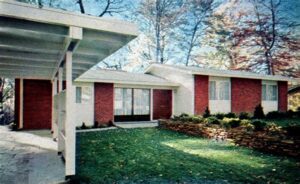Are you curious about the history of your home and who built it? Uncovering the story behind your house can be a fascinating journey, revealing its architectural legacy and the lives of those who constructed it. Whether you’re looking to deepen your connection to your abode, increase its value, or simply satisfy your curiosity, discovering who built your house is an exciting endeavor. In this article, we’ll guide you through the process of researching your home’s history, detailing the key resources and methods you can utilize. From exploring public records to engaging with neighbors, we’ll equip you with the tools needed to uncover the rich narrative behind your residence. Ready to embark on this investigative journey? Let’s get started!
How Can I Start My Research On House History?
Starting your research on your house’s history can be a fulfilling journey that connects you to the past. The first step is to gather as much information about your property as possible. Here are some key strategies to effectively kick-off your research:
- Examine Existing Documents: Look for any original documents you have, such as the title deed, mortgage papers, or old photos. These may contain vital information about previous owners and the construction date.
- Visit the Local Tax Assessor’s Office: The tax assessor’s office may provide records that show who owned the property over the years. This can give you a timeline of ownership.
- Check with the Local Historical Society: Many towns have historical societies that archive information on home constructions, including builders and notable events associated with the house.
- Utilize Online Resources: Websites like Ancestry.com and the U.S. Census Bureau can offer insights into the previous inhabitants of your home. This can sometimes help you trace back to the builder.
- Attend Local Archives or Libraries: They often know about historical building permits and zoning laws that can shed light on your house’s chronology.
Combining these resources will provide a solid starting point for uncovering the layers of your house’s history, ultimately guiding you toward discovering who built your house.
Key Resources To Discover Who Built My House
When trying to answer the question, how can I find out who built my house, several resources can significantly aid your research. Each of these resources has the potential to unlock valuable information about your home’s history and its builders.
Using these resources effectively will enhance your ability to piece together the history of your home and discover answers to the question, how can I find out who built my house.
How Can Public Records Help Identify Builders?
When exploring the question of how can I find out who built my house, public records become an invaluable resource. These documents can unveil a wealth of information regarding the construction of your home and its previous ownership. Below are key types of public records that can assist in uncovering the identity of the builder:
| Type of Record | Description | Where to Find It |
|---|---|---|
| Building Permits | Permits issued during construction often list the contractor and builder. | Local government or county offices |
| Property Deeds | Legal documents that trace ownership and may include notes on construction. | County clerk or registrar of deeds office |
| Historical Tax Records | Records that might indicate when the home was built and its initial value. | Local tax assessor’s office |
| Title Searches | A comprehensive check of property documents for ownership history. | Title companies or local court house |
By systematically researching these public records, you can gather details that illuminate the building process and potentially identify the original builder. This step not only aids in your current quest but also enriches your understanding of your home’s history and legacy.
Connecting With Neighbors To Uncover House Stories
Engaging with your neighbors can be a valuable way to gather insights about your house and its history. Many neighborhoods have a rich tapestry of stories that connect the residents to their homes. Here are some effective strategies to delve into your community’s collective memory:
- Start Conversations: Approach your neighbors and strike up informal conversations. You might discover that they have lived in the area for decades and possess stories about the builders and the initial construction of the homes.
- Attend Local Events: Participate in community gatherings or neighborhood meetings. These events offer opportunities to mingle and learn about the history of the area, including notable builders and architectural styles.
- Form a Neighborhood Group: Consider establishing a local history group where residents can share their knowledge and findings about the houses in your area. This collective effort can yield remarkable insights.
- Utilize Social Media: Join local community groups on platforms like Facebook or Nextdoor. Residents often share historical tidbits and might provide leads on where to find more detailed information about your house.
- Exchange Photographs: Ask neighbors if they have old photographs of your house or the neighborhood. Visual documentation can spark memories and lead to stories about its construction and previous occupants.
By connecting with neighbors, you can enhance your research on who built your house and uncover fascinating narratives tied to your property. As you gather information, remember to document everything you learn for future reference.
Documenting Findings: What Happens After Identifying The Builder?
Once you’ve successfully determined who built your house, it’s essential to document your findings effectively. This not only preserves the history of your home but also provides context for future owners or researchers.
Here are some steps to consider when how can you document your findings:
The goal is to ensure that the history of your home is preserved and appreciated. By taking the time to document and share your findings, you contribute to the larger narrative of your neighborhood and its unique architectural story.
Frequently Asked Questions
Why is it important to know who built my house?
Knowing who built your house can provide insights into its history, architectural style, and quality of construction. It also helps in understanding any renovations or modifications that may have occurred.
What are the first steps to find out who built my house?
Start by checking public records, such as property deeds and building permits, which can typically be found at your local city or county office.
Where can I find historical building permits for my house?
Historical building permits can often be located in your local municipal office or through the building department’s archives. Some towns may have digitalized this information on their websites.
How can I use online resources to find information about my house’s builder?
Utilize online databases such as the National Association of Realtors or historical societies that may have archives of builders and their projects. Websites like Zillow can also provide historical ownership data.
What role do real estate agents play in finding the builder of my house?
Real estate agents often have access to MLS listings and local historical data, which can help you uncover details about your property’s builder.
Can neighbors help in finding out who built my house?
Yes, neighbors may have lived in the area for a long time and could have valuable information about the builder or the house’s history.
What if I still can’t find who built my house?
If you’re unable to find the information through public records or online resources, consider hiring a historian or a local research service that specializes in property histories.





